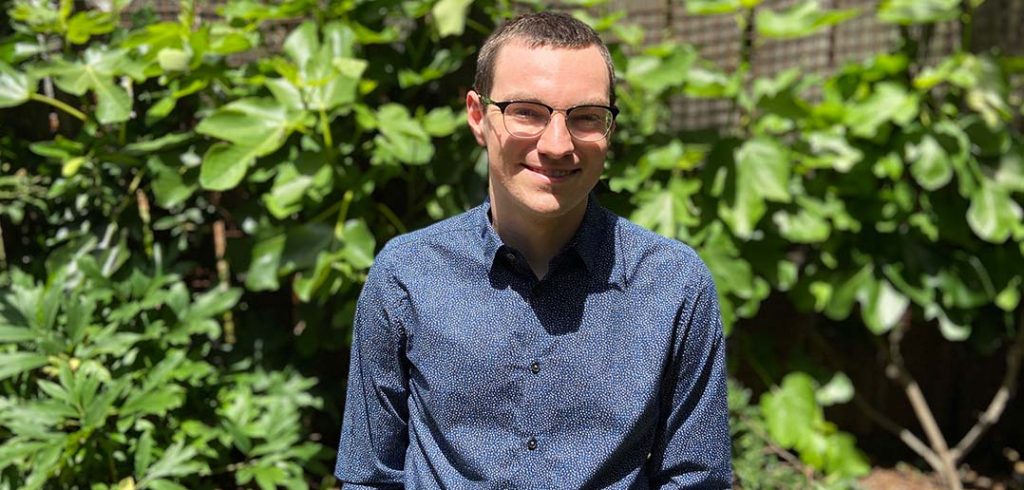“I came into college just really trying to have this one focus. … On the first day of sophomore year I realized I wanted to change my major,” said Singer. “I found these two things that I’m really interested in. My thinking was, ‘Well, I might as well try them both and see what sticks.’ Turns out they both stuck, so here we are.”
Recently, the two disciplines have converged in unexpected ways, particularly when people became infected with COVID-19 at religious gatherings and when large religious gatherings were subsequently banned. As a theology major and a religious Jew, Singer understands the importance of religious rituals in times of crisis. But as a biologist who interned at a virology lab for animals, he understood the public health risk. He doesn’t believe anyone should be in large gatherings during this time for any reason.
“I wasn’t working with the virus directly, but I saw how careful you needed to be and how easy it was to contaminate everything,” said Singer, whose concentration was in organismal biology. “A public health response really needs to have a lot of empathy to be successful. Just in a utilitarian sense, you’re not going to accomplish what you’re hoping to accomplish if you’re not cognizant of what that takes for people.”
Curiosity Beyond the Familiar
Singer said that being a Jew in a Jesuit institution has taught him a lot about understanding others. He said the starting point for any dialogue should be a genuine curiosity about those outside one’s intimate circle.
“It’s not out of trying to debate or find points that you disagree on, because that’s not productive, and that’s not the point of having theological conversations at a school like this,” he said. “It’s more about trying to really understand how another person is thinking, without trying to point out flaws in their argument and break them down. It’s about practicing empathy through logic.”
His mentor, Assistant Professor of Theology Sarit Kattan Gribetz, Ph.D., said Singer is poised to understand the sometimes-rocky intersection of science and theology.
“One of the things that we’re learning right now is how science and medicine are very much connected to all of the other dimensions of our lives: to urban planning and to race and to religion and communities,” said Kattan Gribetz. “Understanding how tied people’s spiritual lives are to their physical health is something that is really important. Someone like Michael who is really comfortable in both worlds can navigate that in really creative ways.”
Separate Interests Converge
The clash between ideology and science is nothing new, said Singer. But studying them together in today’s specialization culture is rare. He recalled his semester studying abroad at Trinity College in Dublin. His European counterparts were confused when he discussed his double major.
“It was completely unheard of for a lot of professors and students that a person could do two unrelated majors,” he said. “But I wouldn’t say they’re completely unrelated disciplines.”
In his studies, he learned that in the 18th century, before science was a fully established profession, theologians attempted to reconcile the two disciplines to show that the scientific discoveries of Newton and Galileo were indeed connected to the spiritual realm.
“They ended up with this really impersonal deity that was divorced from people’s spiritual reality, and ultimately ended up being a very poor reflection of physical reality,” he said of deism, which espouses a belief in a supreme being, though one that doesn’t interact with the natural world.
Though he’s aware of and inspired by the many ways they intersect, he considers his areas of study to be two separate pursuits, with science concerned with the physical and theology focused on the metaphysical, he said. Indeed, some of his theology professors had no idea he was also majoring in biology until he told them.
“I wouldn’t have even guessed he was a biology major, except for that he told me. I would say he’s such a deep humanist. I’m sure he has this really intense, scientific side too, but I really felt, when he was in the class, he was in the class because he was deeply invested in learning theology,” said Kattan Gribetz.
She added that while she imagines Singer has a very bright scientific future ahead of him, he could have had a promising career in theology as well.
Trusting the Text
Singer just completed an internship in a lab at Rockefeller University and will spend the next two years working in a lab at Memorial Sloan Kettering. At Sloan Kettering he’ll be focused on epigenetics, researching DNA in the developmental process to see if mutant signals that lead to cancer can be intercepted. From there, he expects to grasp the research he wants to pursue in graduate school. It would seem that the scientific side of Singer will be at the forefront of his budding career, with theology continuing to inform his life.
“I think one of the things I learned at Fordham is that even though they’re so different, there are these weird places of contact. There’s a concept in theology called exegesis, which, especially when reading the Bible, refers to the idea that you’re supposed to draw out the meaning inherent in the text. You’re not looking for anything in the text. You trust that the text knows what it’s saying and will tell you,” he said.
The concept of exegesis has become very helpful to him in the lab.
“You’re not trying to impose your existing conception of reality on your experiment; that’s data fudging. That’s extremely bad. People lose careers over that,” he said. “What you’re trying to do is just let the observation show you what the real meaning behind the data is. I suppose it’s sort of Zen. … It’s the concept of sort of just working really hard at surrendering to whatever the text is telling you, or the observations are telling you.”

